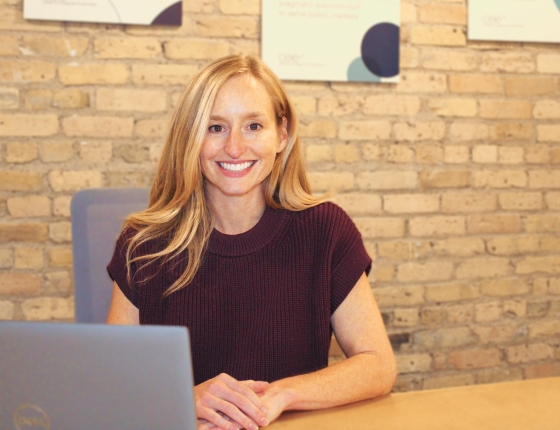Audrey Partridge always felt like some rules were meant to be broken.
“I wasn’t happy just working within the rules and structures given to me,” Partridge said. “I wanted to explore how they could be changed for the better.”
Having grown up in Springfield, Missouri, Partridge moved to St. Paul, Minnesota at 18 to attend Macalester College, where she received a bachelor’s degree in sociology. After working briefly at a mental health nonprofit, Partridge enrolled at the University of Minnesota’s Humphrey School of Public Affairs to pursue a master’s degree in public policy.
“Energy policy wasn't top of mind when I entered grad school, but over time, I realized that it touches everyone and everything in big and impactful ways,” Partridge said. “If done well, it can create high-quality job opportunities, lessen the impacts of climate change, allow people to be safe and comfortable in their homes, and advance our economy. I was quickly hooked, and I've never looked back.”
On graduating, Partridge joined CenterPoint Energy, where she worked first as a regulatory analyst and later as local energy policy manager. In 2017, Audrey accepted a position on CEE’s policy team as regulatory policy manager.
“I was looking for an organization that matched my personal values and mission, and CEE is exactly that,” she said. “CEE is working toward a clean climate and environment, but also a healthy economy, taking a comprehensive look at the clean energy transition and how it affects real people and communities. That was really important to me.”
Low-income eligibility programs
A recent highlight of Partridge’s work at CEE is her contribution to expanding access to Minnesota’s low-income energy efficiency programs. The programs, required through the ECO Act, help homeowners make energy-saving insulation, HVAC, and water heating upgrades. They also address health and safety issues by helping to cover ventilation improvements and mold remediation for income-qualified Minnesotans. However, Partridge found that lengthy administrative processes and limited eligibility definitions made it difficult for those in need to receive assistance. To overcome these issues, Partridge forged a partnership between CEE and Energy CENTS Coalition.
Together, the organizations successfully advocated for revisions to the eligibility definition of “low-income household,” so that more Minnesotans would qualify, and developed language around categorical eligibility. “That means if you're already receiving support through another means-tested or income-qualified program, you can show that instead of having to reprove your income and eligibility,” Partridge explained. “Utilities provide these programs for free to low-income households, so it's vital that people who need them can access them without trouble.”
Minnesota Host Communities Study
Another proud accomplishment is Partridge’s work on the Minnesota Host Communities Study, published in February 2020. To explore the challenges and opportunities associated with power plant retirements, Partridge led an assessment of the social and economic impacts of five power plants across six Minnesota communities that host them.
Among the communities Audrey spoke with during her research was the Prairie Island Indian Community, whose reservation is located on the ancestral homeland of the Mdewakanton Dakota on Prairie Island, at the junction of the Vermillion and Mississippi Rivers in southeastern Minnesota.
The Prairie Island nuclear power plant, which began operating in 1973, was built on land that once belonged to the tribe, immediately adjacent to the reservation. Partridge found that many communities in the study weighed the economic benefits they received from their power plants against the health and safety costs. However, unlike the other host communities, not a single member of the Prairie Island Indian Community is employed at the plant, and the tribe receives no tax revenue from it.
“Working with the Prairie Island Indian Community to hear their stories and understand their history with the nuclear plant, and then to record those stories and publish them for others to read, was really meaningful and a big highlight of my career at CEE,” Partridge said.
Natural Gas Innovation Act (NGIA)
Today, implementation of the NGIA is a significant focus of Audrey’s work.
“During the six years that I worked at CenterPoint, I watched the utility sell more and more natural gas each year — even as we had all these conservation programs that were built to save gas,” Partridge said. “There was so much focus on renewable energy on the electric side, but little attention was being given to how much our use of natural gas was increasing.”
Partridge wanted to refocus the conversation. In 2021, she worked with the Great Plains Institute to gather a diverse group of stakeholders to develop a plan (called G21). Among the group’s recommendations were policies that were eventually included in the NGIA, legislation passed in June 2021 that establishes a framework for natural gas utilities to invest in and advance innovative resources that reduce greenhouse gas emissions of the gas system. Those innovative resources include biogas, renewable natural gas, power-to-hydrogen, power-to-ammonia, carbon capture, energy efficiency, and electrification.
“We’ve identified the problem and the need for more solutions,” Partridge said. “Now, we're getting to work to say, ‘How are we going to do this?’ It's not just, ‘Decarbonize.’ It's, ‘How do we do this in a way that is good for our economy, our workers, and our communities? How do we do this equitably? How do we do this and maintain reliability of our energy needs and affordability for everyday people and businesses?’ It makes me grateful to be at CEE because we're focused on all these important factors.”
